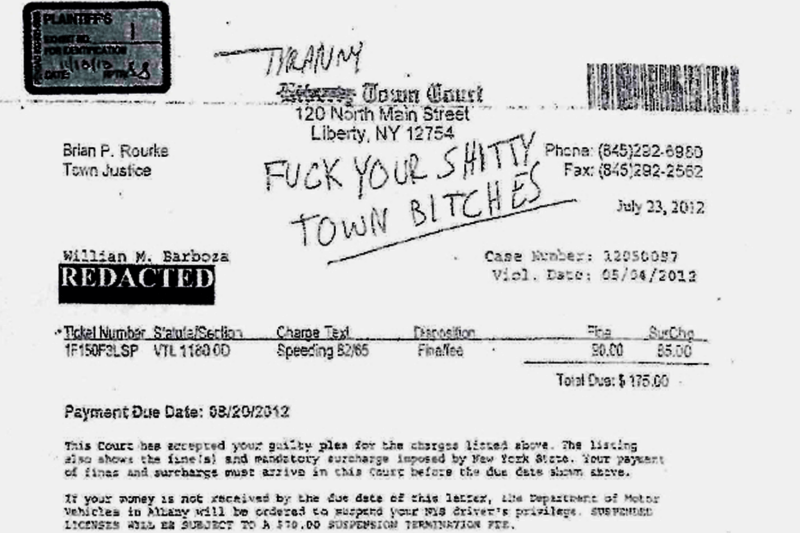
Willian Barboza was 21 years old when he, in frustration, crossed out the name of the New York town “Liberty” and wrote “Tyranny” on a payment form for a speeding ticket he received there and scrawled on it the words, “Fuck your shitty town bitches.”
But what the town did next was truly shitty.
Willian’s payment was rejected, and he was forced to travel two hours from his home to appear at a court hearing where a judge chastised him for his language. Things only got worse when Assistant District Attorney Robert Zangla ordered Willian’s arrest, charging him with the crime of “aggravated harassment” — a misdemeanor punishable by as much as a year in prison. Willian was then handcuffed to a bench, arraigned without a lawyer, and eventually had to bail himself out for $200 after being in custody for hours.
It’s pretty ironic that such a clear violation of freedom of speech occurred in a town named Liberty, and a federal judge agreed, though he didn’t find it the least bit amusing.
Yesterday the NYCLU, which represented Willian along with lead counsel Stephen Bergstein, announced that a federal judge vindicated Willian by ruling that the prosecutor violated his First Amendment right to harmlessly express his opinions about the government without fearing he will be punished or arrested. The court also ruled that the Village of Liberty must stand trial on claims that it had failed to adequately train its police officers about the First Amendment.
Willian’s arrest was obviously unconstitutional. The local judge who dismissed Willian’s charges in 2013 noted that not a single legal citation was required for “this Court to determine that the language under the circumstances here, offensive as it is, is protected.”
And New York’s “aggravated harassment” statute — which made it a crime to communicate “with intent to harass, annoy, threaten or alarm another person” — was perniciously overbroad, so much so that it was struck down and then amended since Willian’s arrest. Government officials don’t have to like what you say about them — they can be “annoyed” or even “alarmed” by criticisms — but that doesn’t make those criticisms unlawful or even harmful.
In fact, criticism of government is a very good thing, as NYCLU Staff Attorney Mariko Hirose explains:
“The First Amendment protects people’s right to express their opinions about the government, and our government is better for it.”
But what’s more — yesterday’s decision agreed that the prosecutor is supposed to know better … and have a thicker skin.
